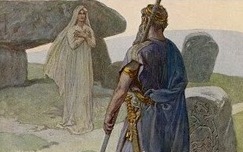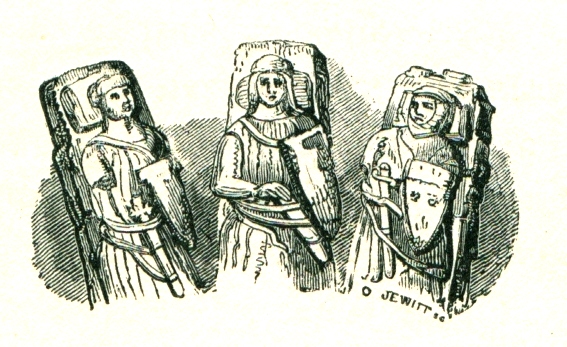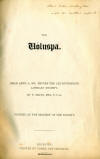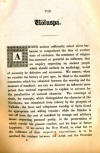The Sibyl's Prophecy

[MAIN][HOME]
For the first time online
| The Völuspá Read Before The Leicestershire Literary Society by Thomas Smith, Esq. F.S.A An Original translation based on the Latin translation in the 1828 Copenhagen Edition |
All stanzas were unnumbered, and presented with a facing Icelandic text (as shown here).
Original pages, documenting the entire lecture, have been reproduced below for examination.
Allar kindir
Meiri ok minni
Mavgu Heimdallar
Vildo it ec Valfavdvr
Vél fyr telia
Fornspiöll fíra
þau er fremst um man
All living beings,
High and low,
Children of Heimdallr.
I, of the World-Father
Will unfold wonders;
The old lays
Which in time past I learned
þar er Ymir bygdi
Vara sandr né sær
Né svalar vnnir.
Jörd fannz æva
Né vupphimin
Gao var ginnúnga
Enn gras hvergi.
When Ymer was:
There was no shore, nor sea,
Nor cool waves,
Earth was no where seen,
Nor heaven above
An all swallowing abyss there was
But no greenth.
Biódom um yþþo
þeir er Midgard
Möran scópo
Sól scein svnnan
A salar steina
þá var grund gróin
Grönom lauki.
Found the golden orbs;
They who Midgard*
Glorious created.
Then shone the sun
On its rocky walls;
Then first the earth grew green
With springing grass.
*Midgard. Middle-guard or middle-yard. In the same way Asgard was the guard or yard of the Asir, and Utgard, where the Iötnur were confined, was the outer yard or utter yard. Yard, guard, garden seem to be derived from the same root.
Sinni mána
Hendi inni högri
Vm himin-iódyr.
Sól þat né vissi
Hvar hon sali atti
Stjörnor þat stadi átto
Máni þat né vissi
Hvat han megins átti.
Companion of the moon,
With his right hand harnessed
The heavenly steeds.
And the sun knew not
Where were his courts;
Nor did the stars know
Their habitation;
The moon knew not
The place of her abode.
Þá gengo regin öll
A raukstóla,
Ginheilög god,
oc vm þat gættuz:
Nótt ok nidiom
Navfn um gáfo,
morgin héto
ok midian dag,
Vndorn oc aptan,
Arom at telia.
Their high-raised seats,—
The most holy Gods,
And consulted of these things,
To night and new moon
Names they gave;
Morning they appointed,
And noon,
Afternoon and evening,
To be signs for years.
A Idavelli
Þeir er havrg oc hof
Hátimbroþo.
Afla lavgdo
Auð smiðoþo
Afls kostodo
Allz freistodo
Tángir scopo
Oc tól gördo.
On Ida plain;
Fanes and courts
Did they raise high.
Furnaces they made,
Precious metals wrought,
With power they strove,
All things they assayed:
Tongs they invented,
And forge tools.
teitir voro
Var þeim vettegis
Vant or gvlli
Vnz þriár qvomo
þursa meyiar
Amättkar mioc
Or Iotonheimom.
The Asir all-glad:
No want was there to them
Of gold.
Until there came
Three Thurse maids,
All fearful,
From Iotunheim.
A raukstóla,
Ginheilög god,
oc vm þat gættoz:
Hverr scyldi dverga
Drottin skepa
Or brímis blódi
Oc or blám leggiom.
Their lofty seats—
The most holy gods,
And there counsel took
Which of them of dwarfs
The troops should create,
Of Ymer's blood,
And blue bones.
. . . to return to the Völuspá, which after the creation of the dwarfs proceeds to describe how man was formed out of two ash trees called Asc and Embla:
Or þní lidi
Avfligar oc ástgir
Æsir at húsi.
Fvundo á landi
Litt megandi
Asc oc Emblo
Orlöglusa
Of the heavenly powers,
Three mighty and beautiful
Asir to the earth.
There found they on the ground,
Of little worth,
Asc and Embla
Without sense or life.
Od þ né havfdo
Lá né læti
Né tito góda.
Avnd gaf Odinn
Od gaf Hönir
Lá gaf Lódvrr
Oc lito góda.
Reason they had not,
Neither blood, nor motion,
Nor bright colour.
Soul Odin gave,
And Hænir reason.
Blood Lodur granted
And a beauteous form.
Asc veit ec standa
heitir Ygdrasil
hár badmr ausinn
hvita auri.
þadan coma davggvar
þærs í dala falla
stendr æ yfir grönn
Urðar brvnni.
Ygdrasil is it called;
A high tree teeming
With pure water.
Thence come the showers
Which on the vallies fall.
It stands ever-flourishing
By Urda's well.
Fyrst í heimi
Er gullveig
Geirom stvddo
Oc í havll Hárs
Hana bendo.
þrysvar bendo
þrysvar borna
opt ósialdan
þo hon en lifr.
Remember I in the world.
When from the earth
The gold ore men dug,
And in the high one's courts
It did burn.
Three times born,
Again and yet again
Yet it still liveth.
Heiði hana héto
Hvars til húsa com,
Völo velspá,
Vitti hon ganda.
Seið hon kvnni,
Seið hon leikin var,
Æ var hon ángan
Illrar þióðar.
When to the house it came,
With its magic art.
Wolves themselves it tamed.
in the magic fire
the metal flows.
It has ever been the delight
of evil men.
A ravkstóla,
Ginheilög god,
Oc um þat gættuz,
Hvart skyldo Æsir
Afráð giallda
Edr skyldo godin öll
Gildi eiga.
Their lofty seats,
The most holy powers,
And consulted of this thing:
Whether the good gods
The crime should avenge,
or whether atonement
For the sin they should accept.
Oc í fólc vm scaut,
þat var enn folkvíg
Fyrst í heimi.
Brotinn var borðvegr
Borgar Asa,
Knátto Vanir vígspá
Völlo sporna.
Among the folk;
Thus first was slaughter
Brought into the world.
Broken was the bound
Of the Asa burg.
The Vanir,* spirits of strife,
Swept the plains.
*Vanir. Little is told of the Vanir except that they were spirits inhabiting the atmosphere, and were thought to have the control of aerial tempests, etc.
Ec sá Baldri,
Blóðgom tívor,
Odins barni,
Orlög fólgin:
The blood-besprinkled god,
The son of Odin,
The appointed doom.
Hapt sá hon liggia
Vndir hvera lvndi
Lægiarn líki
Loka áþeckian.
þar sitr Sigyn
þeygi vm sínom
Ver vel glýioð
Vitod err enn edr hvat?
Bound near the boiling springs,
The faithless form
Which Loki's features bore.
There sits Siguna,
Of her wretched lord
No longer proud.
Understand ye yet, or no?
Sal sá hon standa
Sólo fjarri
Nástrondo á,
Nordr horfa dyr.
Féllo eitrdropar
Inn um lióra,
Sá er vndinn salr
Orma hriggium.
Far from the sun
On Naströnd's* icy shore,
Whence gates open to the cutting north.
Its walls are formed
Of wreathed snakes,
Whose venom rains
Eternally within.
*Naströnd. the coast of dead corpses and evil beings, encompassing the abyss of Hvergelmer and situated in the lowest depths of Niflheim. The dark and poisonous streams, 'Elivagar,' surround it: Nidhog, the great dragon who dwells beneath the central root of Ygdrasil, torments the dead, with the innumberable serpents which inhabit 'Hvergelmer.'
Sá hon þar vada
þúnga strauma
Menn morðvarga
Oc meinsvara
Oc þanns annars glepr
Eyra rúno.
Þar svg Níðhöggr
Nái framgengna,
Sleit vargr vera.
Vitod er enn edr hvat?
Across the dark torrents,
The souls of evil men,
The perjured, the coward,
The secret murderer,
The voluptuous man,
There Nidhog forever gnaws
The corses of the dead.
The Hell-wolf rends them,
Understand ye yet, or no?
Austr sat hin aldna
I Iárnviði
Oc föddi þar
Fenris kindir.
Fyllisk fiörvi
Feigra manna,
Rýðr ragna siöt
Raudum dreira.
Svört verda sólscin
Of svmur eptir,
Vedr öll válynd -
Vitod er enn edr hvat?
towards the east,
Sits night, the mother,
And still brings forth
the giant brood,
R40/H25 Nourished with the breath
Of dying men.
Red blood smears
The holy temples.
Then shall the sun grow dim
In summer tide,
And storms shall sweep the earth.
Understand ye yet, or no?
Brödvr mvno beriaz
Oc at bavnom verda,
Mvno systrungar
Sifiom spilla.
Hart er í heimi,
Hórdómr micill,
Sceggaavld, scálmavld,
Scildir ro klofnir,
Vindöld, vargöld
Aðr veröld steipiz,
Mvn engi madr
Odrom þyrma.
Rent asunder are
The bonds of kindred;
(missing line)
Hard will be the time!
Luxury prevails;
Axe-time, sword-time!
Shields are cleft.
Wolf-time, storm-time
Ere the world falls!
Nor shall one man
Another spare.
Hvat er med Asom
Hvat er med Alfom
Gnýr allr Iotvnheimr
Æsir ro á þíngi
Stynia Dvergar
Fyr steindvrom
Veggsbergs vísir
Vitod er enn edr hvat.
What affrights the Elves?
The giant world rages.
The Asæ flock together.
the dwarfs tremble
Before their rocky doors
Of their cavern haunts.
Understand ye yet, or no?
Svrtr ferr svnnan
med sviga læfi,
Scin af sverdi
Sól valtífa.
Griótbiörg gnata,
Enn gífor rata,
Troda halir helveg,
Enn himin clofnar.
On flames of fire;
A sun shines from the sword
Of the Almighty God.
The mountains shiver,
The giants rush headlong,
Men travel the path of death,
the heavens are cleft asunder.
Sól tecr sortna,
Sigr fold í mar,
Hverfa af himni
Heidar stiörnur,
Geisar eimr
Vid aldvrnára,
Leicr hár hiti
Vid himin siálfan.
The earth sinks into the sea:
Disappear from heaven
The bright stars.
The fire rages
Around the tree of ages:
The flames climb (to)
Heaven itself.
Sér hon vppkoma
Avdro sinni
Jord or ægi
Idia gröna.
Falla forsar,
Flýgr avrn yfir,
Sá er á fialli
Fisca veidir.
Above the waves,
I see a new earth
In its young beauty green.
the waters disappear.
the eagle, which of late
Fished in the mountain tops,
Flies away.
Mvno ósánir
Acrar vaxa,
Bavls mvn allz batna,
Baldvr mvn coma.
Búa þeir Havdr oc Baldvr
Hropts sigtoptir
Shall bring forth corn.
All crimes shall cease
Baldur shall return.
Baldur and Hödur shall
Together dwell
In Odin's blessed seats.
Sal sér hon standa
Sólo fegra,
Gulli þacdan,
A Gimle:
þar sculo dyggvar
Dróttir byggia
Oc vm aldrdaga
Yndis nióta.
In the highest heaven,
The roof glittering with gold.
More glorious than the sun.
There shall the just
Together dwell;
And through eternal time
Happiness shall taste.
Þá cömr inn ríki
At regindómi
Avflvgr ofan,
Aá er öllo rædr.
Semr hann dóma
Oc sacar leggr
Vescavp setr
þau er vera sculo
Shall come to judgement,
The everlasting God
Who governs all.
(From late paper mss.) He shall declare his laws;
And all strife shall cease;
And peace and truth shall reign
For evermore.
| Original Page Images The Völuspá Read April 6, 1838 Before The Leicestershire Literary Society by T. Smith, Esq. F.S.A Double-click to enlarge |
It is the first online edition of this text.
































